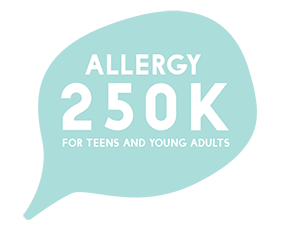Food allergies and the workplace
Top Tips For The Workplace
- Make yourself known, tell your employer about your allergy early on in your employment.
- Share information about your allergy with trusted colleagues too.
"Disclose your food allergy, talk to your employer and discuss strategies to help keep you safe."
Navigating the business world can be challenging, especially when you are applying for your first real job. If you have an allergy, this may create increased anxiety and stress. However, having a job, whether it’s part-time while you study or full time, doesn’t have to be stressful. Many people hesitate to disclose their allergy in a job application – remember you cannot be discriminated against because of your allergy. Discriminating against you is the same as discriminating against someone with a disability. You will be able to carry out almost all jobs just like anyone else and everyone is entitled to a safe work environment.
Find the job that’s right for you
Many of the companies with casual work available for teens and young adults fall within the food service industry (fast food outlets, bakeries, supermarkets, cafes etc) which is challenging for young people with food allergy. If working with food creates anxiety for you, there are other jobs that don’t revolve around food, such as:
- Clothing, apparel and department stores
- Other retail outlets (for example, electronic, book, homewares)
- Pharmacies or newsagencies
- A local RSL or community club
- Bottle shop or bar
- Recreation or sports clubs
Make yourself known
Whether you are working part-time while studying or if you have finished study and are starting your first job out of university/TAFE, you need to let your employer know about your allergy.
Your allergy isn’t visible until a reaction occurs. Tell your employer about your allergy. Tell your colleagues that you work with regularly, about your allergy and what the signs and symptoms of allergic reaction are, and where they can find your adrenaline devices in case of an emergency. Remember, your adrenaline devices should be easily accessible, not in a locked drawer, locker or room at work.
Safe Work Australia requires that all workplaces have staff trained in first-aid. Ask your employer about the first-aid procedures and policies in place that will help keep you safe. Ask about specific anaphylaxis training and let your employer know about ASCIA’s free anaphylaxis training for members of the community.
If you have a food allergy, it is important to be realistic in that it is highly unlikely that food you are allergic to will be removed from your workplace. You can work with your workplace to reduce potential risk to your health and wellbeing by implementing a number of strategies.
Some strategies may include:
- Ask employees to wash cutlery and crockery with warm soapy water or rinse and place straight into the dishwasher immediately after they finish their lunch.
- Ask employees to wipe down the kitchen benches with a clean cloth after they have prepared their lunch. If they are eating something you are allergic to, it is best to use paper towel rather than the dish cloth as this helps decrease contamination of the bench with the food you are allergic to.
- Speak to colleagues that work closest to you. They may be happy to avoid eating the food you are allergic to, if it’s not too onerous.
- If you share desks in an office environment, those that share your desk and computer need to avoid eating at the desk. Whilst touch of an allergen rarely causes anaphylaxis, even a mild to moderate allergic reaction can be distressing. The chances of someone going into anaphylaxis from the smell of a food are also minimal but manageable strategies to reduce potential risk of a reaction are signs of a caring workplace that understands everyone’s needs.
Work Functions
Social work functions such as Christmas parties, are a great opportunity to get to know work colleagues and have some fun together. Professional work functions such as training or networking events are also important for improving your skills and progressing your career. Regardless of the type of function, food will be served, and you will need to manage this if you have a food allergy.
Prior to the function or event
You should not assume that because your food allergy is listed on file that your organisation will cater for you correctly. You MUST speak to the event organiser and remind them of your food allergy and request that there will be safe food for you to eat at the event.
If your organisation sends out an email asking for dietary requirements – MAKE SURE YOU RESPOND TO IT. Follow up with a face-to-face chat with the event organiser and then disclose your food allergy again at the event.
At the function or event
Make yourself known to the food service staff and ask which food items are safe for you to eat. Your organisation may have arranged an entirely separate meal for you, so make sure that you receive the correct food.
It may also be a good idea to have a light meal prior to the event in case you don’t feel confident about the food being provided to you.
On the job tips
- Carry your adrenaline devices.
- Don’t sacrifice safety. Tell your colleagues about your food allergy, and if you feel unsafe at any point during your shift – speak up.
- Pack your own food from home so that you don’t have to rely on purchasing food during your meal break.
Further Information:
- National Allergy Council workplace information
- Allergy & Anaphylaxis Australia managing allergies in the workplace
"Disclose your food allergy, talk to your employer and discuss strategies to help keep you safe."

